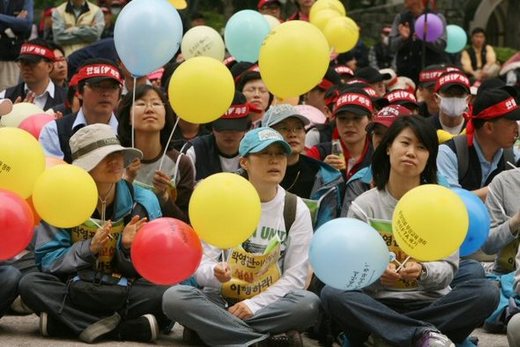 |
|
A group of union members took part in the 116th anniversary celebration of May Day, in Seoul, May 1.
|
Move will gain labor ground in negotiations
Recently, unionized workers of the nation’s major automakers voted to put themselves under the control of the specialized Federation of Korean Metal Workers, an attempt to strengthen their hand in negotiation with management on wages and other working conditions.
The 44,000-strong union of Hyundai Motor, the nation’s largest automaker, made the decision to change their union representation from their company-based one to the industry-wide one, as did unionized workers of GM Daewoo Auto and Technology Co., an affiliate of U.S. auto giant General Motors Corp.
The move is sending jitters through the business community, which worries that the new industry-based unions will make management-labor disputes more difficult to solve.
"Thought there are discrepancies in labor conditions among individual companies, an industry-based labor movement, which applies unified demands in negotiation, would cause endless labor disputes," said Kim Young-bae, vice chairman of the Korea Employers Federation.
Such skepticism is widespread as to whether the industry-based labor movement will be able to resolve age-old problems such as discrimination against part-time and contract workers. Kim So-rim, an executive of Korea Automobile Manufacturers Association, said that labor unions at large conglomerates need to change their attitude to seek a balance in labor-management talks. "However, there is no sign that labor unions at large companies [are trying to] do so," Kim So-rim said. Samsung Group, currently without a labor union, is also feeling the pressure of the recent shifts in the labor community. "From January next year, multiple labor unions will be allowed here," a Samsung official said. "There is no way to block employees from joining industry-based labor unions." By contrast, GM Daewoo, which is known for relatively friendly relations with unionized workers, seems to be fairly comfortable with the change. Chief Executive Nick Reilly recently told a press conference that the impact would not be significant in that the company has pushed for cooperative relations with unionized workers for a long time.





